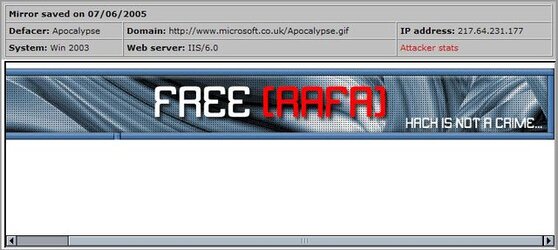- Joined
- Dec 31, 2004
- Location
- Osan AB, South Korea
First:

Next:


You've got to be kidding me. I dont think Mr. Hesse even knows what a rootkit is.http://www.techdirt.com/articles/20051108/0117239_F.shtml said:Sony's response to the whole rootkit fiasco has been anything but reassuring -- which is probably why they're facing a series of lawsuits about the matter. However, the folks over at Digg have highlighted what might be the single most ridiculous statement on the matter from a Sony executive during an NPR interview about the matter. After taking issue with anyone using the terms "spyware, malware or rootkit," Thomas Hesse, President of Sony's Global Digital Business, literally says: "Most people, I think, don't even know what a rootkit is, so why should they care about it?" Ah, right. Because people don't know about this technology that was installed without proper notification, which hides things on their computers, which can be misused by those with malicious intent to hide more software on their computers potentially causing all sorts of damage... they have nothing at all to worry about. This goes beyond the "trust us" response they were originally stating to the unfathomable rationale that what you don't know about can't possibly hurt you.
Next:
http://www.eff.org/deeplinks/archives/004145.php said:If you thought XCP "rootkit" copy-protection on Sony-BMG CDs was bad, perhaps you'd better read the 3,000 word (!) end-user license agreement (aka "EULA") that comes with all these CDs.
First, a baseline. When you buy a regular CD, you own it. You do not "license" it. You own it outright. You're allowed to do anything with it you like, so long as you don't violate one of the exclusive rights reserved to the copyright owner. So you can play the CD at your next dinner party (copyright owners get no rights over private performances), you can loan it to a friend (thanks to the "first sale" doctrine), or make a copy for use on your iPod (thanks to "fair use"). Every use that falls outside the limited exclusive rights of the copyright owner belongs to you, the owner of the CD.
Now compare that baseline with the world according to the Sony-BMG EULA, which applies to any digital copies you make of the music on the CD:
If your house gets burgled, you have to delete all your music from your laptop when you get home. That's because the EULA says that your rights to any copies terminate as soon as you no longer possess the original CD.
You can't keep your music on any computers at work. The EULA only gives you the right to put copies on a "personal home computer system owned by you."
If you move out of the country, you have to delete all your music. The EULA specifically forbids "export" outside the country where you reside.
You must install any and all updates, or else lose the music on your computer. The EULA immediately terminates if you fail to install any update. No more holding out on those hobble-ware downgrades masquerading as updates.
Sony-BMG can install and use backdoors in the copy protection software or media player to "enforce their rights" against you, at any time, without notice. And Sony-BMG disclaims any liability if this "self help" crashes your computer, exposes you to security risks, or any other harm.
The EULA says Sony-BMG will never be liable to you for more than $5.00. That's right, no matter what happens, you can't even get back what you paid for the CD.
If you file for bankruptcy, you have to delete all the music on your computer. Seriously.
You have no right to transfer the music on your computer, even along with the original CD.
Forget about using the music as a soundtrack for your latest family photo slideshow, or mash-ups, or sampling. The EULA forbids changing, altering, or make derivative works from the music on your computer.
So this is what Sony-BMG thinks we should be allowed to do with the music on the CDs that we purchase from them? No word yet about whether Sony-BMG will be offering a "patch" for this legalese rootkit. I'm not holding my breath.

